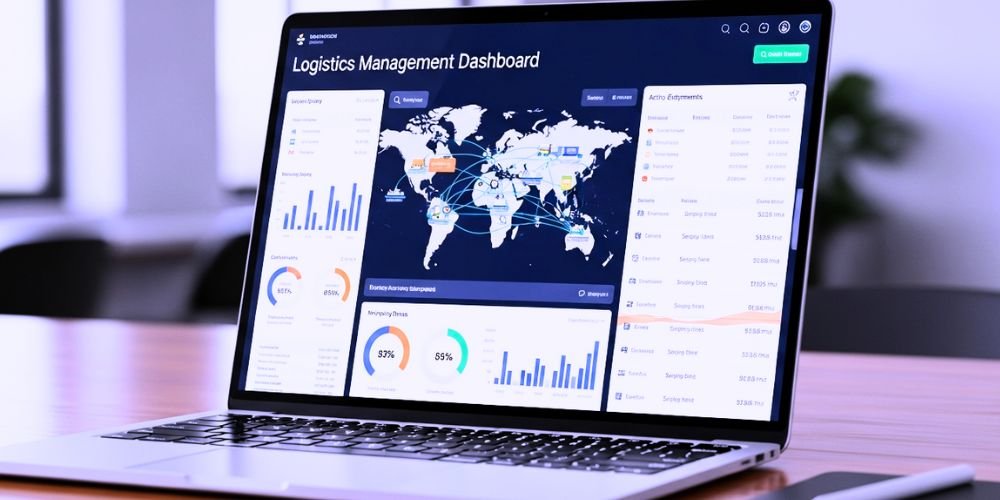In today’s interconnected world, logistics management plays a pivotal role in the efficient movement and distribution of goods and services. From raw materials sourcing to product delivery, logistics management encompasses various activities that facilitate the smooth flow of goods through supply chains. This article delves into the significance of logistics management, its key components, challenges, and vital role in optimizing global commerce.
The Significance of Logistics Management
Logistics management is the backbone of supply chain operations; ensuring products reach their intended destinations promptly and cost-effectively. The significance of logistics management can be understood through the following key points:
Supply Chain Efficiency
Efficient logistics management ensures that goods move seamlessly through the supply chain, from suppliers to manufacturers, distributors, and end consumers. By streamlining the flow of goods, logistics management reduces lead times, minimizes bottlenecks, and enhances overall supply chain efficiency. A well-coordinated and optimized supply chain reduces waiting times, increases throughput, and improves customer satisfaction.
Cost Reduction
Effective logistics management can reduce transportation, warehousing, and inventory holding costs. Logistics managers can achieve cost savings and improve the business’s bottom line by optimizing routes, consolidating shipments, and implementing just-in-time inventory practices. Cost reduction measures in logistics also contribute to enhanced competitiveness in the market.
Customer Satisfaction
Timely and reliable deliveries are critical for maintaining high levels of customer satisfaction. A well-managed logistics system ensures that products reach customers when and where needed, increasing customer loyalty and repeat business. Meeting customer expectations regarding delivery times and product availability is essential for building strong client relationships.
Global Trade Facilitation
Logistics management is instrumental in facilitating international trade in an increasingly globalized world. By managing the movement of goods across borders, handling customs clearances, and complying with international regulations, logistics managers enable businesses to access new markets and expand their reach. Efficient global logistics networks create opportunities for businesses to grow and foster economic development.
Critical Components of Logistics Management
Managing the supply chain can be complex, but ensuring that products and materials get to the right place at the right time is essential.
Transportation Management
Transportation is a central element of logistics management, involving moving goods from one location to another. Logistics managers analyze shipping routes, select appropriate transportation modes (e.g., road, rail, sea, air), and optimize freight forwarding to ensure cost-effective and timely deliveries. Effective transportation management involves coordinating carriers, tracking shipments, and managing delivery schedules.
Warehouse Management
Warehouse management focuses on efficiently storing and handling inventory. Logistics managers optimize warehouse layouts, implement inventory tracking systems, and manage order fulfillment to reduce storage costs and improve order processing times. A well-organized warehouse with streamlined inventory management ensures quicker order processing and reduces the risk of stockouts.
Inventory Management
Effective inventory management ensures that the correct quantity of products is available at the right time. Logistics managers must balance sufficient inventory to meet demand while avoiding excess stock that ties up capital and incurs holding costs. Inventory optimization techniques, such as ABC analysis and Economic Order Quantity (EOQ), aid in managing inventory efficiently.
Order Processing and Fulfillment
Order processing involves receiving and processing customer orders, while order fulfillment ensures that the products are accurately picked, packed, and shipped to customers promptly. Efficient order processing and fulfillment contribute to enhanced customer satisfaction. Leveraging technology, such as order management systems and barcode scanners, improves accuracy and speed in order processing.
Supply Chain Visibility
Logistics managers leverage technology and data analytics to gain real-time visibility into supply chain operations. With supply chain visibility, they can proactively identify issues, optimize operations, and respond swiftly to disruptions. Advanced technologies like the Internet of Things (IoT) and blockchain enhance supply chain transparency and traceability.
Challenges in Logistics Management
One of the biggest challenges in logistics management is maintaining a balance between supply and demand.
Global Supply Chain Complexity
As supply chains become more global and interconnected, logistics management faces complexities related to cross-border regulations, customs clearance, and geopolitical uncertainties. Navigating diverse legal and cultural landscapes requires logistics managers to understand international trade practices and principles.
Transportation Costs and Sustainability
Transportation costs, especially in long-haul or international shipments, can be significant. Logistics managers must seek cost-effective transportation solutions while considering sustainability and environmental impact. Encouraging eco-friendly transportation options and optimizing shipment consolidation can contribute to sustainable logistics practices.
Inventory Optimization
Balancing inventory levels to meet demand while minimizing carrying costs and stockouts is challenging for logistics managers. Accurate demand forecasting and agile inventory management systems are essential to overcome this challenge. Adopting data-driven inventory planning and demand forecasting methodologies can improve inventory optimization.
Last-Mile Delivery
The last-mile delivery, the final leg of product delivery to the end consumer, poses challenges due to the increasing expectations for speedy and convenient deliveries. Implementing efficient last-mile delivery solutions is critical for customer satisfaction. Innovative approaches like crowd shipping and drone delivery are being explored to address last-mile challenges.
The Role of Logistics Management in Global Commerce
Logistics management plays a critical role in global commerce by ensuring the efficient and timely movement of goods across borders and between countries.
Supply Chain Resilience
Effective logistics management enhances supply chain resilience by anticipating and mitigating potential disruptions. With contingency plans, logistics managers can respond swiftly to unforeseen events, for example, natural disasters or transportation delays. Resilient supply chains are better equipped to withstand disruptions and maintain business continuity.
Market Expansion
Logistics management enables businesses to expand their markets by reaching customers in distant locations. An efficient logistics network allows companies to tap into new markets and improve their customer base. Logistics management supports market expansion strategies by providing reliable and timely deliveries across regions.
Cost Savings and Efficiency
By optimizing transportation routes, consolidating shipments, and improving inventory management, logistics managers can achieve cost savings and enhance overall supply chain efficiency, contributing to improved profitability. Cost-efficient logistics operations translate into competitive advantages for businesses.
Competitive Advantage
Logistics management can be a differentiating factor for businesses in today’s competitive landscape. A well-managed logistics system allows companies to deliver superior customer service, faster deliveries, and streamlined operations, giving them a competitive edge in the market. Logistics excellence can be a significant driver of customer loyalty and market differentiation.
Conclusion
Logistics management is the backbone of modern commerce, facilitating the efficient global movement of goods and services. Logistics managers are critical in streamlining international trade from supply chain efficiency to cost reduction and customer satisfaction. By effectively managing transportation, warehousing, inventory, and order fulfillment, logistics management enhances supply chain resilience and enables businesses to expand their reach.
Overcoming challenges such as global supply chain complexities and sustainability concerns, logistics management remains a driving force in the success of companies worldwide. Embracing technological advancements and data













